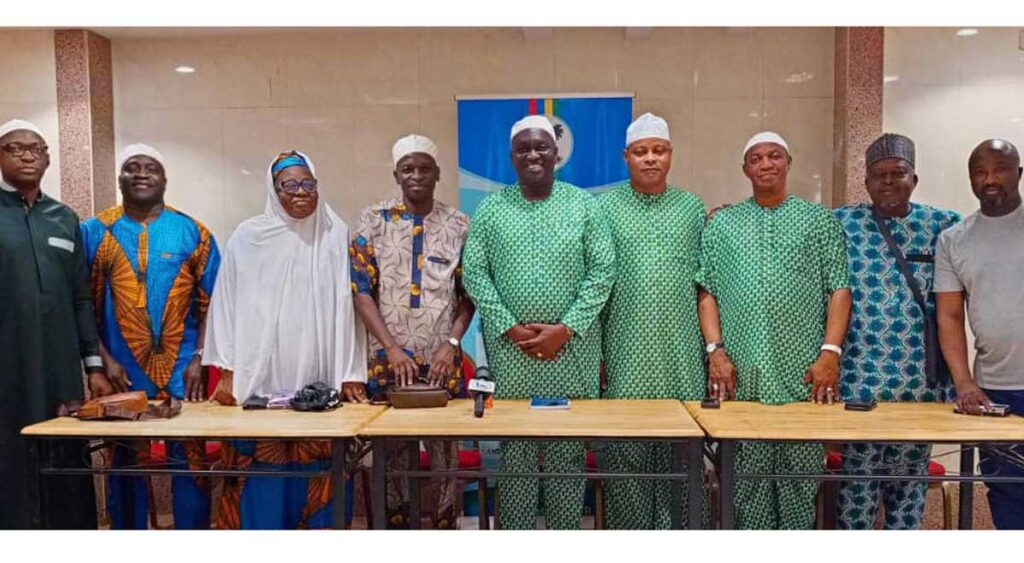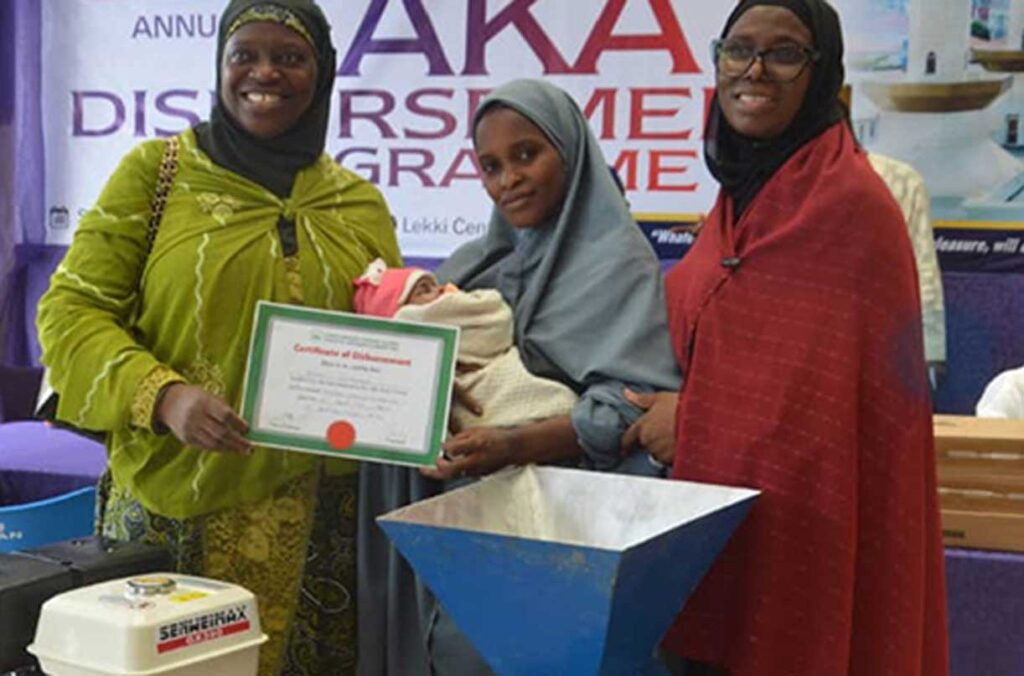
Adebayo Adelabu (left) and Chairman/CEO, NERC, Sanusi Garba
The new Nigerian Electricity Act 2023 is a landmark legislation that aims to reform the power sector nationwide and address its longstanding challenges. But as noble as the provisions are, effective implementation will be one of the greatest constraints of legislating Nigeria out of blackouts, JOSEPH ONYEKWERE, reports.
The Electricity Act (Amendment) Bill, 2023, which was signed by the president in 2024, repealed the Electric Power Sector Reform Act, No. 6, 2005 and consolidated the laws relating to the Nigerian electricity supply industry.
It also provides a comprehensive legal and institutional framework for the power sector in the areas of electricity generation, transmission, system operation, distribution, supply, trading, enforcement of consumer rights and obligations.
It provides for a holistic integrated resource plan and policy that recognises all sources for the generation, transmission, and distribution of electricity, including the integration of renewable energy into Nigeria’s energy mix and attracting investments as well as other related matters.
The primary objective of the Act is to provide a comprehensive legal and institutional framework to guide the operation of a privatised, contract and rule-based competitive electricity market in Nigeria and attract through transformative policy and regulatory measures, private sector investments in the entire power value chain of the Nigerian Electricity Supply Industry (NESI).
Specifically, the Act seeks to provide an ideal legal and institutional framework to leverage the modest gains of the privatisation phase of the electric power sector to accelerate growth in power generation capacity and improve utilisation of generated power through increased investments in new and efficient power generation technology and revamping existing power plants.
To promote policy and regulatory measures to ensure the expansion of power transmission networks in Nigeria to address any imbalance in the existing transmission infrastructure; stimulate policy and regulatory measures to generally scale up efficient power generation, transmission, and distribution capabilities of the power sector to achieve a national electricity access targets and attaining the highest per capita power consumption in Africa within a reasonable time frame; and stipulate consequential, transitional and saving provisions regarding reforms made under the provisions of the repealed Act.
Also, part of its objective is to promote the development of a competitive electricity market; stimulate policy measures that will attract investments across the Nigerian electricity value chain to re-energise economic growth, drive job creation, and improve the living conditions of Nigerians; and provide a clear legal and institutional framework for the formulation and adoption of a National Integrated Electricity Policy and Implementation Plan.
It is also intended to stimulate policies to address technology limitations and outdated infrastructure that are responsible for value chain losses in the NESI by attracting sustainable investments in new and efficient power generation technology and revamping existing power plants; eliminating through policy and regulatory measures, barriers to investments in generation, transmission, distribution, and related sub-sectors in the electricity industry; and promote policies and regulatory measures to increase geographic coverage in power generation, transmission, distribution and supply.
Apart from providing a framework to stimulate the development and utilisation of renewable energy sources and create an enabling environment to attract investment in renewable energy, it provides a framework for the improvement of access to electricity in rural, unserved, underserved, peri-urban and urban areas through the use of conventional sources and renewable energy off-grid and mini-grid solutions as well as the promotion of indigenous capacity in technology for renewable energy sources through a framework for local content in the electricity supply industry.
The Act also recognises third-party investments in NESI infrastructure by private and public sectors; provides a clear framework for cross-border electricity trade in the interest of national security and energy self-sufficiency; promotes frameworks for the security of electricity infrastructure, prescribes effective punitive measures against electricity theft and other offences peculiar to NESI; and strengthens the relationship between federal electricity market and state electricity market among other copious provisions.
The law seeks to address the development and environmental concerns of host communities and sets aside five per cent of the actual yearly operating expenditures of power-generating companies (GENCOs) from the preceding year for the development of their respective host communities.
It further provides that the funds set aside for the development of host communities will be received, managed, and administered for infrastructure development in the host communities by a reputable Trustee/Manager to be jointly appointed by the respective GENCO and their host community.
The Act has several implications for NESI and its stakeholders, such that it empowers the Nigerian Electricity Regulatory Commission (NERC) to regulate the electricity sector within Nigeria and transition regulatory responsibilities to state regulators when they are established.
It enables states, companies, and individuals to generate, transmit and distribute electricity within their respective jurisdictions, subject to NERC’s oversight and approval; mandates electricity generation licensees to meet renewable generation obligations as prescribed by NERC and promotes the integration of renewable energy into Nigeria’s energy mix and grants the National Assembly the power to carry out oversight functions over the NESI through its respective Committees on Power in the Senate and House of Representatives.
Furthermore, the Act protects the rights and obligations of electricity consumers and provides for dispute resolution mechanisms.
However, the Act also faces some challenges, such as the need for effective implementation and enforcement of the provisions of the Act by the relevant authorities and stakeholders; the need for coordination and harmonisation of the roles and responsibilities of the federal, state and local governments in the electricity sector and the need for adequate infrastructure and capacity development to support the increased generation, transmission and distribution of electricity.
Others include the need for public awareness and education on the benefits and opportunities of the Act for electricity consumers and investors.
Human rights lawyer, Toluwani Yemi Adebiyi, argued that lawmaking is not a problem in Nigeria, but the implementation/compliance has consistently remained a big challenge.
According to him, part II of the new Act, on National Integrated Electricity Policy and Strategic Implementation Plan is of great interest.
“The entire Section 3 (part II of the Act) talks of the Federal Government initiating the process for the preparation of an integrated Electricity Policy and Strategic implementation plan within one year from the commencement of this Act, even to develop the power Sector with optimal utilisation of other resources such as coal, natural gas, nuclear substances, etc., to the extent of rural electrification and provision of electricity to all rural areas, the Villages, Hamlets, etc.
“All these as contained in Sections 3(1),(2)(a-g) are good and of great interest, but can they come to pass within an anticipated shortest time? Initiating the process for the preparation of these laudable ideas may for a long time never see the light of the day not to talk of doing it within one year, because of our failed systematic adherence to time frame,” he pointed out.
Same, he said, was said of providing Meters to all electricity consumers within certain months of implementing the repealed 2005 Act, till today thousands of consumers remain unmetered and are still exploited under the notorious estimated billings.
Adebiyi noted that despite NESI’s burning desire to implement, improve and navigate into other sources of power for abundant supply to even rural areas, they cannot be effectively achieved without adequate capital.
His words: “How can such be attained when the Federal Government (MDAs) alone is having about N100 billion unpaid electricity bill? This was buttressed by the Executive Director of the Association of Nigeria Electricity Distributors, Sunday Oduntan, recently. Even the President had to pay the N342.3 million unpaid electricity bill by Aso Villa.”
The lawyer stated that N280.98 billion has remained unpaid out of N1.063 trillion billed to customers in the first nine months of 2023. This figure, he argued, included the Federal Government’s N100 billion, which represents about 30 per cent of its indebtedness.
“With this huge indebtedness, making remarkable progress to improve and implement financially required provisions would remain a mirage and indeed a protracted illusion.
“To make the dreams in the new Act a reality, the Government must show its readiness to put in place stronger and sustainable policies that specifically target the distribution companies, else the over 13,000 Megawatts of installed power generation capacity and 7,100 Megawatts transmission capacity will all be a waste,” he declared.
Similarly, lead Partner, Infusion Lawyers, Senator Ihenyen, believes the new Act is a step in the right direction. According to him, while concerns over the implementation of the copious provisions of the new Act are understandable, Nigerians must also appreciate that the electricity sector is huge with multiple players and value chains that need to be comprehensively catered to.
He noted that the new Act repealed up to five Acts, consolidating the laws in the sector, including the Electric Power Sector Reform Act, 2005; Nigerian Electricity Management Services Agency (Establishment) Act, 2015; and various laws on hydroelectric power producing areas development.
“The new Act has established an administration and governance framework that I believe would help in better improving the level of implementation of the regulations and policies of the government. Here, the Nigerian Electricity Regulatory Commission (NERC) has a critical role to play, as well as the Rural Electrification Agency, Directorates of the Agency, Nigerian Electricity Management Services Agency, and the National Hydroelectric Power Producing Areas Development Commission.
“Besides, since the new Act has introduced state licensing, I expect that this will help Nigeria unleash possibilities at the state level, enabling state governments to license and regulate persons who wish to undertake the supply and sale of electricity within a state.
“As implementation deepens, we should expect power projects to take off in the states, including mini-grid projects, independent electricity distribution networks (IEDN), and independent electricity transmission networks (IETN). The recently launched Geometric Power Plant in Abia State may have opened the window of possibilities in this regard,” he said.
Also, Lagos-based lawyer, Stephen Azubuike agreed that the new Act is a significant step towards achieving a self-sustaining, profitable, and sufficient electricity sector in Nigeria.
He, however, pointed out that its success would depend on the commitment and collaboration of all the parties involved in the NESI.
“No doubt the electricity sector has known several statutory reforms which are yet to holistically translate into steady and stable power supply. But some progress is being made.
“It is hoped that the new Electricity Act will consolidate this progress, especially through a meaningful implementation of the significant introduction of the full liberalisation regime and the integration of renewable energy technologies. We all await to see a bright light at the end of this dark tunnel in the history of electricity in Nigeria,” he said.













